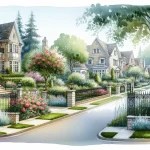The West Bank area of New Orleans, situated west of the mighty Mississippi River, is a distinct tapestry woven from diverse neighborhoods, each with its own unique character and history.
In This Article
TL;DR
- The West Bank’s landscape is shaped by the Mississippi River’s influence, creating a unique ecosystem with wetlands and marshes.
- Its neighborhoods reflect diverse cultural influences from early settlers to more recent ethnic groups.
- The area showcases the resilience and adaptability of its residents in the face of socio-economic dynamics.
Understanding West Bank’s Geography and Demographics
The Geographical Layout of West Bank
The West Bank is located directly across from the city’s iconic French Quarter and Central Business District. The Mississippi River has sculpted the landscape, creating a unique ecosystem with wetlands and marshes. The area’s proximity to the river has been vital for transportation and economic development.
Population and Demographic Trends
With a diverse population exceeding 200,000 residents, the West Bank communities reflect a rich blend of cultures. While population growth has been steady, demographic shifts have contributed to the area’s cultural diversity, celebrated through vibrant festivals, culinary traditions, and community events.
Historical Overview of West Bank Neighborhoods
Early Settlements and Development
The history of the West Bank’s neighborhoods can be traced back to the early French and Spanish colonial settlements. Neighborhoods like Algiers, Gretna, and Marrero emerged as military outposts, agricultural hubs, and industrial centers, fueled by the expansion of railroads and various industries.
Architectural and Cultural Heritage
The West Bank’s neighborhoods boast a rich architectural heritage, ranging from historic shotgun houses and Creole cottages to stately plantation homes and grand mansions. Cultural traditions and celebrations, such as the Gretna Heritage Festival and the Algiers Riverfest, celebrate the area’s unique heritage and promote its lively music, cuisine, and arts scene.
Key Neighborhoods of West Bank
Algiers
Algiers, the oldest and most historic neighborhood, is a captivating blend of past and present. Its charming streets are lined with beautifully preserved shotgun houses and Creole cottages, and landmarks like the Algiers Courthouse offer a glimpse into the area’s storied past. The annual Algiers Riverfest celebrates the neighborhood’s unique heritage.
Gretna
Gretna, once an agricultural community, has embraced its industrial heritage while embracing new opportunities for growth. Its historic downtown district and annual Gretna Heritage Festival celebrate the city’s diverse cultural influences and foster a strong sense of community pride.
Marrero
Marrero has evolved from an agricultural community into a thriving residential area that offers a unique blend of suburban living and small-town charm. Its historic homes and the annual Marrero Farmers Market celebrate the area’s agricultural roots and promote local businesses and sustainable living practices.
Harvey
Harvey, with its rich industrial history, continues to embrace its roots while diversifying its economic base. The neighborhood is home to a thriving business district and offers vibrant community life through parks, recreational facilities, and cultural events, fostering a sense of community pride.
Socio-Economic Dynamics and Community Life
Economic Development and Challenges
While industries like shipbuilding, manufacturing, and oil refining have provided employment opportunities, the West Bank has faced economic challenges. Efforts are underway to diversify the economic base, attract new businesses, and foster entrepreneurship. Community organizations work to address socio-economic issues and create opportunities for economic empowerment.
Community and Cultural Activities
The West Bank’s diverse communities celebrate their rich cultural heritage through vibrant festivals and events, fostering a strong sense of community pride and cultural appreciation. Community organizations play a vital role in organizing and promoting these cultural activities, ensuring the preservation of the area’s traditions.
Education and Public Services
Educational Institutions
The West Bank is home to a variety of educational institutions, ranging from public and private schools to vocational training centers and community colleges. Community involvement in education is a hallmark of the area, with initiatives aimed at supporting student success and providing access to quality education.
Public Services and Infrastructure
The West Bank is served by various public services and infrastructure, including public transportation systems, healthcare facilities, libraries, parks, and recreational facilities. Ongoing efforts focus on improving and maintaining the area’s infrastructure to enhance the quality of life for residents.
Environmental and Recreational Features
Green Spaces and Environmental Initiatives
Despite its urban and industrial landscapes, the West Bank is home to several green spaces and environmental initiatives aimed at preserving and protecting the area’s natural resources. Parks like the Bayou Segnette State Park and community-led initiatives promote sustainability and foster environmental stewardship among residents.
Recreational Activities and Venues
The West Bank offers a diverse range of recreational activities and venues, including sports complexes, cultural centers, and opportunities for water-based activities along the Mississippi River and surrounding waterways, catering to residents and visitors of all ages and interests.
Economic Opportunities and Business Landscape
Local Businesses and Entrepreneurship
The West Bank’s business landscape is characterized by a thriving community of local businesses and entrepreneurial ventures, reflecting the resilience and entrepreneurial spirit of its residents. Local organizations and community programs support small businesses and foster entrepreneurship through initiatives like business incubators, mentorship programs, and access to funding opportunities.
Tourism and Hospitality
While often overshadowed by downtown New Orleans, the West Bank offers a unique and authentic experience for visitors seeking to explore the area’s rich history and cultural heritage. The hospitality industry plays a vital role in the local economy, with hotels, bed and breakfasts, and tour operators catering to visitors from around the world, showcasing the vibrant culture and traditions of the West Bank communities.






